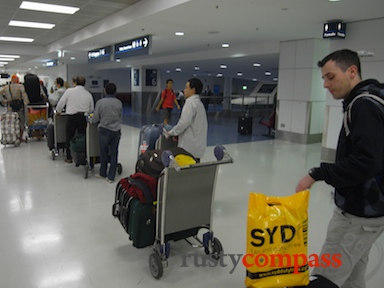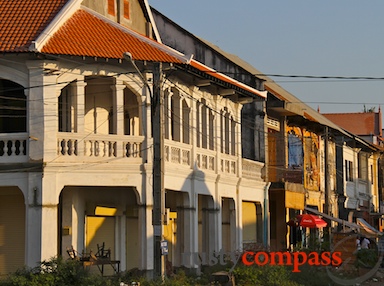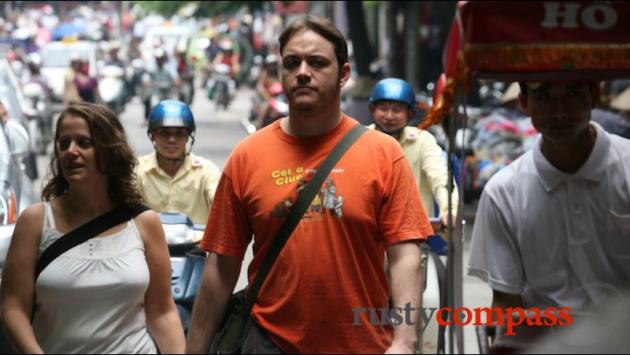And you haven’t even left home yet.
Your next point of vulnerability will be the taxi service at your destination airport. You can fairly safely judge the level of regard a destination has for you by how well it manages your arrival.

Photo: Mark BowyerTravellers about to experience Saigon's taxi mayhem.
Incidentally, Hanoi, Phnom Penh and Siem Reap airports (and most domestic airports in Vietnam) have fixed fare services that are slightly more expensive but relieve you of the stress and uncertainty of travelling with a dodgy taxi. There is one in Saigon as well although you could easily miss it. Unfortunately it’s operated by one of the city’s worst taxi companies - the taxi company owned by the airport..... but it is only 40,000VND more expensive than the normal fare and probably worth it for those feeling anxious.
Watch that phone
You’re in your taxi now and en route to town - a good time to call home and let them know you’ve arrived safely. Don’t. Your phone company, yes the one you have pledged loyalty to in the form of a contract, views your travel plan as an outstanding opportunity to reap a huge windfall at your expense. They'll be levying something they call international roaming charges. They will of course tell you that these are charges levied mainly by the local operator.

Photo: Mark BowyerKampot, Cambodia. Free wifi in cafes, restaurants and hotels is pretty standard even in remote parts of Cambodia and Vietnam.
In the days ahead, I’ll be outlining ways of minimising your exposure to these ripoffs. For now though, let’s focus on the ripoffs themselves.
If you think international roaming is nasty for phone calls, try data. If you’ve just purchased that Iphone and can’t wait to use it on your holiday, stop now. 3G roaming charges are the most egregious of travel rip offs. If you think your phone company likes you, think again. Rates that can be as much as a thousand times the rate you pay at home are the norm.
I just checked the Telstra Australia site for its 3G international roaming charges. A single rate for all countries is listed at $0.015AUD per kilobyte. Sounds cheap right? Except that these days most of us measure our data in gigabytes (billions), not kilobytes (thousands).
Per kilobyte rates have never been used to measure download rates on the contracts you’ll be familiar with from home so let’s see how they play out and adjust the per kilobyte rate up to a more familiar per gigabyte rate. Most monthly packages on smartphones now include at least 1 gigabyte of data.
If you value a gigabyte of mobile data at between 10AUD and 20AUD (these prices are normally bundled with other features but these are reasonable approximations for users on a contract), that same gig of data when global roaming will set you back somewhere between $7,500AUD and $15,000AUD. That’s staggering eh - and definitely cause for keeping the 3G service totally shut down when travelling.
In Australia, Optus rates are worse than Telstra’s above. 3’s are close to Optus’s at the high end of the range.

Photo: Mark BowyerHoi An, Vietnam. A little less paranoia about street food prices might be in order. Check your phone and credit card statements.
Imagine purchasing a product for $10 at home, travelling abroad and finding locals paying the same only to discover that for you, the fee will be $10,000. That’s the scale of the rip off. It’s scandalous. And the only difference in the real cost to the telco is the small accounting cost that allows it to bill data from third countries.
If these prices are the best phone companies can negotiate globally (of course they’re not) then this should be an entirely separate product covered by completely different permissions. Even savvy consumers do not expect to be paying 500 or 1000 times more to use a service just because they are abroad.
And telcos do little to alert users of this outrage. Their websites make no mention of the extraordinary discrepancy between at home and roaming charges. They simply replace gigabite with kilobyte in their wording which is akin to replacing billions with thousands. Unfortunately many consumers don’t spot the difference.
And as communication costs tumble everywhere, these ludicrous prices are totally counterintuitive leaving consumers even more vulnerable.
The EU and other governments are now looking into this matter though it is taking a long time for them to act. The Australian Telecommunications Ombudsman reports a massive rise in data roaming complaints against telcos.
What to do about money?
Planning to use your credit card aplenty during your travels? It may be the most convenient and safest way to handle sizeable transactions. But expect to be punished - and the bigger the transaction, the bigger the punishment.
My credit card company (Mastercard) applies something called an international transaction fee to all charges. It comes in at just under 3%. When you consider that most small to medium hotels and other outlets in Vietnam and other countries also add a 3% charge to credit card transactions, that’s almost 6% .
Then there is a margin on the foreign exchange transaction - though I haven’t been able to establish precisely what that is. And that’s before you start to pay any interest on your credit card bills and does not take account of any annual charge you may pay the credit card issuer.
It all adds up - especially when you consider that credit card companies also charge merchant fees. And all that happens before you start copping high interest charges.
If you really want some nasty credit card shocks, I suggest you neglect to pay your minimum due balance on time - something easily overlooked during travels. You may think that the $25 fee is your punishment. You’re wrong. Failing to pay a minimum balance may push you into a new category of charges (one the banks love) until such time as ALL of your outstanding charges for the applicable statement are covered. If you pay your minimum balance two days late, you waive your 55 interest free (approximation) days until the entire outstanding balance has been paid. This means that you will be paying high interest on ALL new transactions from the time you transact them. Nasty eh? And while this detail is no doubt buried in the product disclosure information, the banks feel no obligation to use their personalised websites, emails or sms’s to alert customers that they have entered the credit card torture zone. Why would they?
American Express does not seem to levy international transaction charges but I’m finding that outside of large expensive hotels, restaurants and airlines, most outlets don’t accept American Express, or if they do, levy a surcharge of anything up to 5%. Not really a solution but it may work out a slightly better deal by the time you factor a 3% levy from the merchant and close to 3% from the credit card company.
And the hotels....
Other travel ripoffs pale alongside those committed by phone companies and credit card companies. Nonetheless, international hotels that charge travellers 200USD++ per night before hitting them up for another $20 plus per day for internet access are right off the planet. In Australia, a country that is facing a tourism crisis, this practice is common.

Photo: Mark BowyerEven at the temples of Angkor, like it or not, you're never far away from free wifi. It can still be challenge to find it in Australian cities let alone the bush.
And the airlines?
It’s hard to complain too much about airlines - after all, international air travel remains unbelievably cheap. And running an airline sure aint easy. But that shouldn’t mean that airlines offset their losses at the excess baggage counter.
On my return home from Vietnam last week, I was well over my baggage limit and fully expected Singapore Airlines to hit me up for excess baggage. What shocked me was the totally arbitrary figure that was charged. The rate advised was 22USD per kg. That’s very very expensive.
My air ticket cost me $1200AUD. My ticket entitles me to my weight, my checked luggage and some hand luggage. Let’s say that weighs in at 120kgs. That comes to rate of $10AUD per kg for the return flight or $5AUD per kg per sector - or less than a quarter of what was being charged at the excess baggage counter. And my excess baggage was happy to travel without meals, entertainment and service of any kind in the cargo hold.
I’m very happy to pay a premium to carry excess baggage - but four times is too much - especially when you are already a loyal customer and you have no real alternatives once at the airport.
I couldn’t find any advice on excess baggage charges on the Singapore Airlines website. I did find an option to purchase additional excess baggage allowance in advance of flying on the Qantas website and the rates out of Asia were 40% what I paid per kilogram on Singapore Airlines.
Vietnam Airlines offers travellers an extra ten kilos of excess baggage on flights from Australia - which may come in handy for those with big shopping plans. It’s worthwhile compensation for the fact that the inflight entertainment is virtually non-existent and the meals and service tend to be ordinary compared with Singapore Airlines.
In the days ahead I’ll be providing some ideas of how you might minimise your exposure to these rip-offs. See you soon.
MB





1 comment so far
This is definitely a "caveat emptor" story. I was recently relieved on $21.00 and my credit card number by an "online Visa" provider masquerading as the web site of the Vietnamese embassy in Canberra. Search for “Vietnam Embassy Australia” or “Vietnam Visa” and the first four or five sites Google offers are remarkable accurate copies of the official site. I should have seen that the URL looked a bit unusual but the site itself looks pretty legit. It all looks quite official, and the followup process is convincingly bureaucratic (almost clumsy). I received a number of follow up emails attaching PdFs of important sounding documents and informing me of progress on my application. When I asked by email how they were going to attach my visa to my passport, there was obviously a real person on the other end telling me that it would all be done at HCMC airport. The final confirmation email assured me that there will be a special queue to join once I get to HCMC airport, at which point I should produce the documents they sent and a passport sized photo. I should then expect to pay a fee for my visa in addition to my online fee, at the airport. That fee is - you guessed it - the price of a visa if you buy it through the embassy. My suspicions aroused, I rang the embassy in Canberra and was told by a very embarrassed sounding official that "no, this is a private firm. They are not reliable". "By ‘not reliable’ do you mean that I do not now possess a visa for Vietnam?" "No you need to come to the Embassy or the Consulate in Sydney". For the record, when I fronted at the Embassy the staff were extremely professional. My in-person application was dealt with quickly, politely and efficiently.